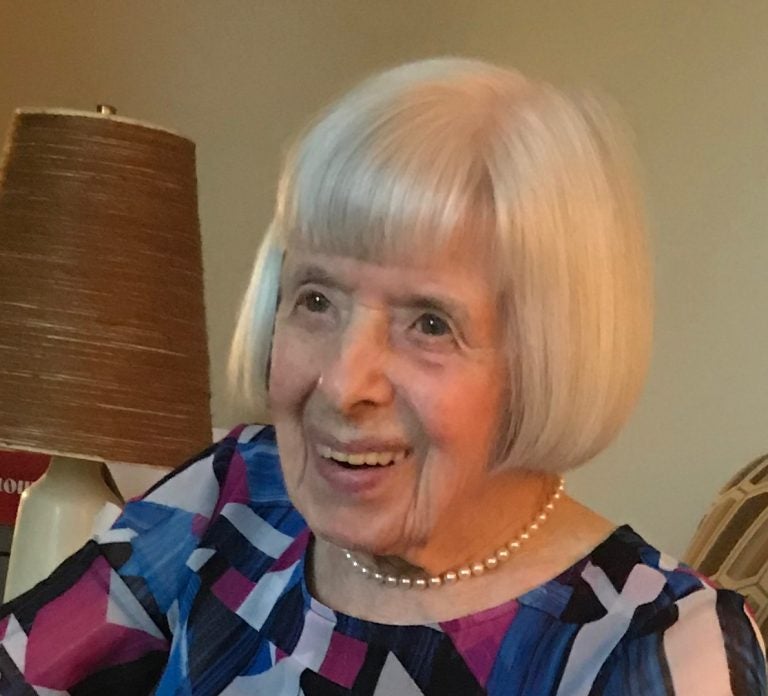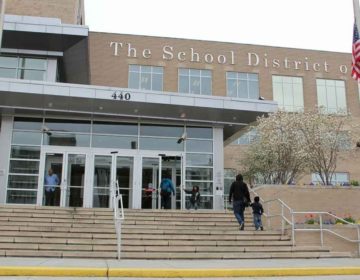Helen Oakes, civic activist and former Philadelphia school board member, dies at 94
Famous for her newsletter, Helen Oakes was a watchdog and gadfly during tumultuous times.

Helen Oakes in a recent photo. (Courtesy of The Notebook)
This article originally appeared on The Notebook.
—
Helen Oakes, who served seven years on the city’s Board of Education and for 19 years wrote an influential newsletter about crucial issues in Philadelphia’s schools, died on May 22, two months shy of her 95th birthday.
Mrs. Oakes, an unfailingly polite but doggedly persistent public school advocate, published 157 newsletters between 1970 and 1989, spanning the years when strikes were commonplace and politics overwhelmed the day-to-day concerns of parents and teachers. This was a gap her newsletter sought to fill.
She wrote on subjects ranging from how reading is taught, to standardized testing, to how schools were using computers in their early days, to the District’s budget. For each topic, she did careful reporting and prided herself on her depth and accuracy.
She also was an early data maven, publishing annually between 1975 and 1981 — way before sophisticated computerized spreadsheets and before the District regularly made public such things itself — a school-by-school statistical analysis that included enrollment, average class size, absentee rates for staff and students, and reading scores.
In style, she was vastly different than many of today’s parent and community activists who brashly and relentlessly challenge the leadership of the District. But they would recognize her mission.
“The newsletter’s goal was to contribute to restoring the Philadelphia public school system to financial health and changing the system so that it would better serve the educational aspirations and needs of the students,” she wrote in 1994.
Sadly but not surprisingly, the issues she was concerned about are still dominant today: the closing of school libraries, the racial achievement gap, resource inequities among schools, teacher turnover, high schools that disengage students.
“She always wanted to be very certain she had done thorough research, and her positions were both carefully thought out and well documented,” said her son Dennis. “Sure, it was a perspective that maybe not everybody shared, but she always wanted to be sure that while you might disagree with the conclusions, you really couldn’t question the facts because she’d done such diligent research.”
Rhonda Lauer, principal of the Jackson Elementary School in South Philadelphia in the late 1980s and early 1990s, said that Mrs. Oakes “was the most honest person…She had such integrity. She was an eloquent writer. She always spoke truth to power. She was an advocate for teachers and for school leaders. Most importantly, she was an advocate for children.”
Lauer said as a principal she would be “nervous” when Mrs. Oakes was coming for a visit because she knew she’d be in for a thorough interrogation. Sure enough, on one such visit “she was grilling me” about everything — teachers, students, reading, writing, the school community, “the whole thing.”
When the school day was over, Lauer offered to walk her to her car. Mrs. Oakes declined but asked what time Lauer was leaving.
“I told her I had to stay until my kids came back from a ski trip,” Lauer said. “She stayed with me until 9 p.m. I kept thinking, all these other things, what can you say about a person who does something like that?” It was out of simple kindness, but she would still apply her critical eye to whatever was happening at the school, Lauer said.
“She really devoted her life to the welfare of kids who needed the most. And she was always talking about kids being able to read and write, and that really came from her love of journalism and her love of the written word.”
Lauer, who later became an assistant superintendent, said that Oakes’ emphasis on data had an impact on the system.
“As a system, as a District, we relied more on data than we used to because of her,” Lauer said. “That was something she taught us as a system — what is the data telling us.”
While her subscription rate was small, about 600, Mrs. Oakes estimated its readership at 2,400, which included most of the city’s movers and shakers. She would send copies to the mayor, City Council, school board members and other influential people, whether or not they subscribed. She supported the work through a small subscription fee — $10 a year — along with contributions and foundation grants.
Mrs. Oakes and her husband Earle, an architectural artist who died in 2011, raised their four children in Overbrook and sent them all to public schools — Overbrook Elementary, Beeber Junior High, and Overbrook High School.
Unlike many white families in her neighborhood at the time, they did not choose private schools or opt for magnets like Central or Girls High.
“We thought from the vantage point of our values Overbrook was a better place for them to get their education,” Mrs. Oakes said in 1989. “It was a period of time when the school was changing racially, and it was during the time when Martin Luther King was assassinated, but there was a very good education to be gained.”
Mrs. Oakes was from upstate New York and herself went to private school, graduating from Smith College with a major in physics. Like many highly educated stay-at-home moms of her generation, she devoted herself to volunteer work and activism through such organizations as the League of Women Voters. Once, around 1960, its education committee did a statistical study of the city schools, the results of which appalled her and subsequently focused her life’s work.
“At the time there were tremendous inequities between predominantly black and white schools,” she said in a 1989 Inquirer interview. “I had an emotional basis for becoming involved in public education.”
She was a member and then became chair of the West Philadelphia Schools Committee, which was dedicated to “secure for every child an equal opportunity” and advocated for desegregated schools before disbanding after making little headway in that area.
It was at her husband’s suggestion that she decided to start a newsletter, she said.
She attended every school board meeting, then in its old headquarters at 21st Street and Benjamin Franklin Parkway. “I would joke that she went to more meetings than the school board members did,” said her son Dennis.
Mrs. Oakes was named to a task force on school desegregation, formed in the wake of a complaint against the District filed by the Pennsylvania Human Relations Commission. But she resigned before the report was issued because she thought the final product had been hijacked by the staff of Superintendent Michael Marcase, who was generally resistant to confronting this volatile issue. In a 1978 newsletter, she called for Marcase to be fired, contending that he was not up to the task of leading the District “in these difficult times.”
In 1977, Mrs. Oakes told Inquirer reporter Steve Twomey that she would like to serve on the Board of Education, and in April 1982, Mayor William J. Green III granted her wish. He appointed her to fill out an unexpired term on the nine-member board and later to a full six-year term. (At the time, Dennis Oakes was Green’s chief of staff.)
“In the last half of the 20th century, I don’t think there was a single citizen or person who cared more about the Philadelphia schools, or who worked harder at it just as a citizen, not as an officeholder,” said the retired mayor in an interview Thursday. “She deserved to be on the school board. Nobody cared like she did and took joy from doing wonderful public service as she did for decades.”
She continued writing her newsletter while a board member and acted very much the outsider, much to the chagrin of some of her fellow board members and Marcase’s successor, Superintendent Constance Clayton, the first woman and first African American to lead the system.
Her membership on the board ended on a sour note. While Mrs. Oakes supported most of Clayton’s initiatives, she was not shy in her criticisms when she disagreed, and the two women did not get along. She made no secret that she wanted to be reappointed when her term expired in 1989, but Mayor Wilson Goode replaced her with banker Floyd Alston, who later became board president. Mrs. Oakes publicly complained that Clayton and Board President Herman Mattleman wanted her out, but Goode said to be put off by her open campaigning for the job, never personally gave a reason for his decision.
A lengthy article in the July 2013 issue of the Pennsylvania Magazine of History and Biography by William W. Cutler III focused on Mrs. Oakes’ experience as a civic activist. “By writing and publishing her own newsletter on the Philadelphia Public Schools, she challenged long-standing assumptions by demonstrating that a stay-at-home mother could play a leadership role. Her work helped pave the way for Dr. Constance Clayton to become the city’s first female superintendent of schools, but it did not prepare her for the resistance she would encounter first as a citizen activist and then as a member of the Philadelphia school board. The social capital she developed among outsiders like herself did not guarantee her access to power, and it eroded once she became a public official; as an insider, she could no longer participate freely in the network of communication and understanding upon which her rise to a position of power was built.”
Still, Cutler wrote, “…both as an outsider and an insider, she helped shape the conversation in Philadelphia about public schools.”
The complete collection of her newsletters and other papers is available at the Temple University Archives.
After leaving the board, she worked as an educational consultant. During her long career, she received many honors, including from the Philadelphia Association of School Administrators, the Citizens Committee for Public Education, the West Philadelphia Chamber of Commerce, and the Chapel of the Four Chaplains, which gave her its humanitarian award.
She lived in her Overbrook home until about three years ago, when she moved to an assisted living facility in Bala Cynwyd. In addition to Dennis Oakes, she is survived by son Jeffrey Lewis-Oakes and a daughter, Peggy Shorr, eight grandchildren and one great-granddaughter. She was predeceased by son David Oakes.
Dennis Oakes said that a celebration of her life for family and close friends is scheduled around what would have been her 95th birthday on July 21. Burial will be private.
WHYY is your source for fact-based, in-depth journalism and information. As a nonprofit organization, we rely on financial support from readers like you. Please give today.





